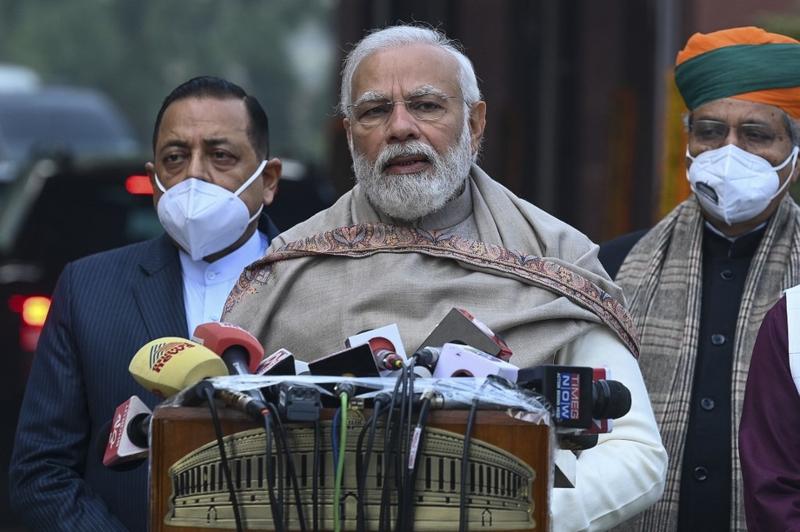 India's Prime Minister Narendra Modi (center) addresses the media at the Parliament during the opening of the budget session in New Delhi on Jan 31, 2022. (PRAKASH SINGH / AFP
India's Prime Minister Narendra Modi (center) addresses the media at the Parliament during the opening of the budget session in New Delhi on Jan 31, 2022. (PRAKASH SINGH / AFP
KUALA LUMPUR / BANGKOK / TEHRAN / HANOI / SINGAPORE / JERUSALEM / BANDAR SERI BEGAWAN / MANILA / SYDNEY / ULAN BATOR / SEOUL / NEW DELHI - Indian Prime Minister Narendra Modi defended his government's efforts to fight the COVID-19 pandemic over the last two years, saying on Tuesday they led to high economic growth and middling inflation, unlike the situation in some advanced economies.
Economic growth is estimated at 9.2 percent in India's fiscal year ending in March and at 8 percent to 8.5 percent the next, after a contraction of 6.6 percent in fiscal 2019/20, while retail inflation hovers around 5.5 percent, well within the central bank's target of 2 percent to 6 percent.
"I want to assure everyone that while the pandemic lasts, we will protect the poor," Modi said, as he accused opposition parties of creating panic about the impact of the pandemic.
India's COVID-19 death toll crossed 504,000 on Wednesday, a level some analysts said was breached last year, but was obscured by inaccurate surveys and unaccounted dead in rural areas, where millions remain vulnerable to the disease.
Despite the pandemic, India's economy was growing at the fastest pace among major economies, while manufacturing incentives helped bolster growth, Modi said.
Opposition criticism of Modi's handling of the pandemic highlighted that India slipped last year to 101 among 116 nations on the Global Hunger Index, from a previous ranking of 94, while many people faced difficulties.
Meanwhile, India's COVID-19 tally rose to 42,339,611 on Tuesday with 67,597 new cases registered during the past 24 hours across the country, showed the federal health ministry's latest data.
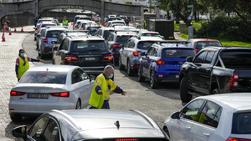 Traffic marshalls direct cars at a drive-through COVID-19 testing clinic at Bondi Beach in Sydney, Australia, on Jan 8, 2022. (MARK BAKER / FILE/ AP)
Traffic marshalls direct cars at a drive-through COVID-19 testing clinic at Bondi Beach in Sydney, Australia, on Jan 8, 2022. (MARK BAKER / FILE/ AP)
Australia
Thousands of students in the Australian state of Victoria tested positive for COVID-19 since returning to classrooms, while the state government hasn't decided yet to extend the school surveillance testing.
There were 2,368 school students and 125 staff in the state tested positive on Monday, taking the infection tally to 7,046 school students and 925 staff since schools reopened last week, according to Victoria's Education Minister James Merlino on Tuesday.
Despite the infections, no schools have been forced to return to remote learning, and Merlino argued the current highly recommended twice weekly rapid antigen testing is "really providing confidence and comfort to everyone in school".
"We knew there will be positive cases once we do the surveillance testing, but it means we identify the cases early, and this will overall drive the number down, stopping the transmission," Merlino said.
Meanwhile, Victoria recorded 20 COVID-19 deaths and 9,785 infections on Tuesday, an increase of more than 1,500 from the previous day's tally.
Under the state's back-to-school plan, the surveillance testing is only for the first four weeks of term one. The state government is yet to make any extension to the plan, saying that the situation will be reviewed in time and they will inform any changes.
However, this school COVID-19 testing program will be expanded to children aged three to five at early childhood services, Victorian Premier Daniel Andrews announced on Tuesday.
Brunei
Brunei is suffering its third wave of COVID-19 with surging infections in the past several weeks, and the government has urged people to get their third vaccine dose as early as possible.
Brunei reported 368 new COVID-19 cases on Monday, bringing the total tally to 18,152.
With all the newly recorded cases identified as local infections, the Southeast Asian country has witnessed a quickly rising number of weekly new cases.
The country's COVID-19 tally hit 1,371 from Jan 31 to Feb 6, 2022, up from 281 in the past week, which is also higher than the caseloads of 251 and 247 for the previous two weeks.
According to a statement from Brunei's Ministry of Health Monday evening, the country is now going through the third wave of COVID-19, "where the number of cases is expected to increase beyond the total reported during the second wave."
However, the health ministry said that the number of severe cases who would require oxygen assistance and intensive care during the third wave "will continue to be low and not exceed the number logged in the second wave".
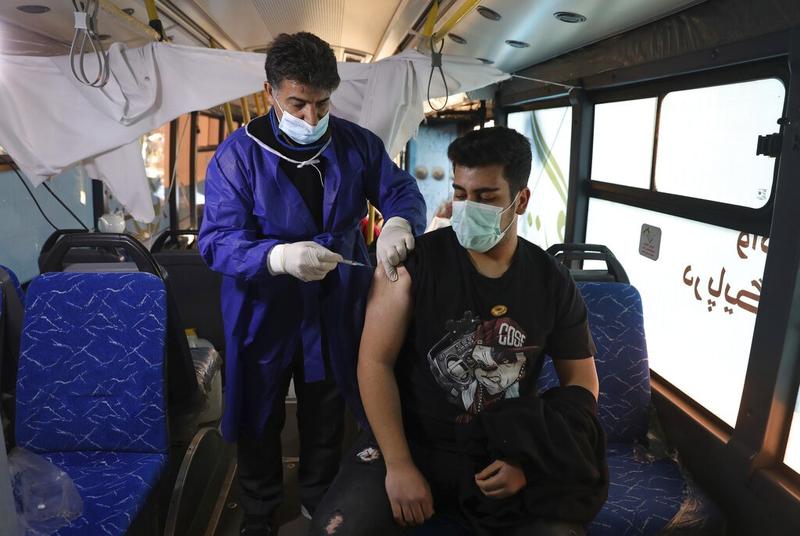 A man receives a COVID-19 vaccine at a mobile vaccine clinic bus at the Grand Bazaar of Tehran, Iran on Jan 22, 2022. (VAHID SALEMI / AP)
A man receives a COVID-19 vaccine at a mobile vaccine clinic bus at the Grand Bazaar of Tehran, Iran on Jan 22, 2022. (VAHID SALEMI / AP)
Iran
Iran's Health Ministry on Monday reported 39,819 new COVID-19 cases, bringing the total number of COVID-19 infections in the country to 6,619,085.
The pandemic has claimed 104 lives in the last 24 hours, bringing the total death toll from the virus to 132,934, according to the ministry.
As of Monday, 61,170,578 Iranians had received their first doses of the COVID-19 vaccine, including 54,561,630 receiving two shots and 19,973,438 receiving three.
The Omicron variant of COVID-19 has surged in Iran over the past weeks after the first case of the variant was detected in the country on Dec 19, 2021.
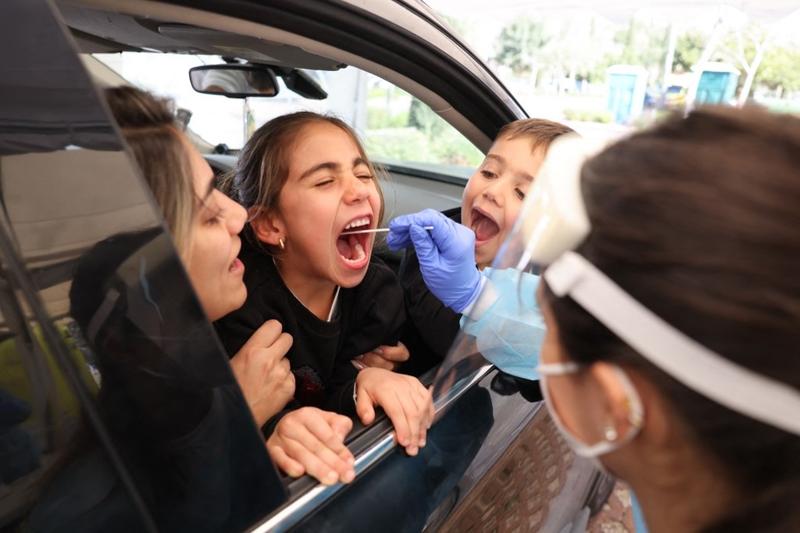 An Israeli paramedic collects a swab sample from a child at the Magen David Adom (Red Shield of David) COVID-19 coronavirus testing center in Jerusalem on Jan 11, 2022. (MENAHEM KAHANA / AFP)
An Israeli paramedic collects a swab sample from a child at the Magen David Adom (Red Shield of David) COVID-19 coronavirus testing center in Jerusalem on Jan 11, 2022. (MENAHEM KAHANA / AFP)
Israel
About 700 cases of BA.2, a sub-variant of COVID-19 Omicron strain, have been detected in Israel, the country's national coronavirus czar Salman Zarka told a press briefing on Monday.
It is a doubling from the 350 cases released on Jan. 31 by Zarka, and Sharon Alroy-Preis, head of public health services at the Health Ministry.
"We are monitoring the variant in other countries, and we fear that its spread in Israel will cause us thousands of morbidity cases for many weeks," Zarka said.
However, he added the hospitals in Israel are not at risk of collapsing despite the emerging sub-variant.
The ministry reported 52,600 new COVID-19 cases on Monday, bringing the total cases to 3,218,391.
The number of death cases from the virus rose to 9,180, with 20 new fatalities, while the number of patients in serious condition in Israel decreased from 1,263 to 1,235, the ministry said.
Earlier on Monday, much-relaxed new requirements of Israel's COVID-19 Green Pass system took effect.
According to the new rules, restaurants, cinemas, hotels, and gyms, among other places, no longer require a green pass upon entry.
 A bus driver sanitizes the interior of a bus before passengers' boarding at Larkin bus station in Johor Bahru, Malaysia, Nov 29, 2021. ( VINCENT THIAN / AP)
A bus driver sanitizes the interior of a bus before passengers' boarding at Larkin bus station in Johor Bahru, Malaysia, Nov 29, 2021. ( VINCENT THIAN / AP)
Malaysia
Malaysia's coronavirus recovery council on Tuesday said it has recommended a full reopening of borders as early as March 1 without mandatory quarantine for travellers, as part of plans to accelerate economic recovery.
The Southeast Asian nation has shut its borders since March 2020 and froze the entry of foreign workers to try to contain novel coronavirus outbreaks.
The recommendation comes as neighbours waive quarantine requirements to attract vaccinated tourists, including Thailand, the Philippines and Singapore.
Muhyiddin Yassin, a former premier and chairperson of the National Recovery Council (NRC), a government advisory body, said travellers would have to undergo COVID-19 screening before departure and on arrival.
At present, Malaysia allows quarantine-free entry to people from Singapore as part of a bilateral arrangement.
Daily coronavirus infections in Malaysia have surged in recent weeks to their highest in four months, driven by the Omicron variant.
It reported 13,944 new infections on Tuesday, adding to more than 2.9 million cases recorded overall, with over 32,000 deaths, among the highest fatality and infection rates in Asia per capita.
The majority of the cases were asymptomatic or mild due Malaysia's high vaccination rate, the health ministry said on Monday.
Mongolia
Mongolia on Tuesday confirmed 1,100 new COVID-19 cases over the past 24 hours, bringing the national caseload to 451,690, said the health ministry.
In addition, four more related deaths were reported in the past day, raising the death toll to 2,059, the ministry said.
Currently, a total of 5,306 COVID-19 patients are hospitalized across the country, while 23,235 patients are receiving home-based care, it said.
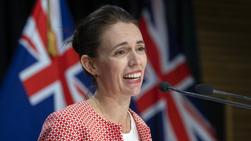 New Zealand Prime Minister Jacinda Ardern announces the country will move to red traffic light setting as part of new COVID-19 restrictions during a press conference in Wellington on Jan 23, 2022. (MARK MITCHELL / NEW ZEALAND HERALD VIA AP)
New Zealand Prime Minister Jacinda Ardern announces the country will move to red traffic light setting as part of new COVID-19 restrictions during a press conference in Wellington on Jan 23, 2022. (MARK MITCHELL / NEW ZEALAND HERALD VIA AP)
New Zeland
The COVID-19 pandemic will not end with the Omicron variant and New Zealand will have to prepare for more variants of the virus this year, Prime Minister Jacinda Ardern said on Tuesday in her first parliamentary speech for 2022.
Ardern's warning came as hundreds of protesters gathered outside the parliament building in the capital Wellington, demanding an end to coronavirus restrictions and vaccine mandates.
"Mr Speaker, advice from experts is that Omicron will not be the last variant we will face this year," Ardern told lawmakers in the speech which was livestreamed.
"It’s not over. But that doesn’t mean we cannot move forward. And keep making progress. And so we are," she said.
Ardern's government has enforced some of the toughest pandemic restriction in New Zealand for the last two years, as the government tried to keep the coronavirus out.
The policies helped keep infections and deaths low. A country of five million people, New Zealand has had about 18,000 confirmed COVID cases so far and 53 deaths.
But it also angered many who faced endless home isolation, and tens of thousands of expatriate New Zealanders who were cut off from families back home as the borders remained sealed. The measures have also been devastating for businesses dependent on international tourists.
Ardern's approval ratings plummeted in the latest 1News Kantar Public Poll released last month, as the public marked her down for the delays in vaccinations and in removing restrictions.
Hundreds of anti-vaccine mandate and anti-government protesters gathered outside the parliament demanding an end to all pandemic restrictions, part of a series of protests undertaken in recent months.
The government said last week that the country will reopen its borders to the rest of the world in phases only by October.
Singapore
ingapore reported 7,806 new confirmed cases of COVID-19 on Monday, bringing the total tally to 405,629.
Of the new cases, 2,496 cases were detected through PCR (polymerase chain reaction) tests and 5,310 through ART (antigen rapid test) tests, according to statistics released by the Ministry of Health (MOH).
South Korea
South Korea recorded 36,719 more cases of COVID-19 as of midnight Monday compared to 24 hours ago, raising the total tally to 1,081,681, the health authorities said Tuesday.
The daily caseload was up from 35,286 in the previous day, hovering above 30,000 for the fourth consecutive day, according to the Korea Disease Control and Prevention Agency (KDCA).
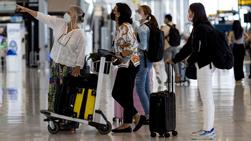 Passengers look at the flight schedule screen at Suvarnabhumi Airport in Bangkok on Feb 1, 2022, as Thailand resumes its quarantine free-travel scheme for vaccinated travelers.
(JACK TAYLOR / AFP)
Passengers look at the flight schedule screen at Suvarnabhumi Airport in Bangkok on Feb 1, 2022, as Thailand resumes its quarantine free-travel scheme for vaccinated travelers.
(JACK TAYLOR / AFP)
Thailand
Thailand on Monday reported 10,470 new COVID-19 cases and 12 more fatalities in the previous 24 hours, according to the Center for COVID-19 Situation Administration (CCSA).
This is the third day in a row that the country has recorded more than 10,000 daily cases. The last time that Thailand continued to report more than 10,000 daily caseloads was in mid-October 2021.
The capital Bangkok, Samut Prakan, Chon Buri, Nonthaburi and Phuket provinces reported the most cases during the past 24 hours, according to the country's COVID-19 task force.
Vietnam
Vietnam reported 16,815 new COVID-19 cases on Monday, including 16,809 locally transmitted and six imported, according to its Ministry of Health.
The Vietnamese capital Hanoi remained the highest number of infections on Monday with 2,988 cases, followed by central Nghe An province with 1,247 cases and central Da Nang city with 935 cases.
The infections brought the country's total tally to 2,358,786 with 38,424 deaths.


